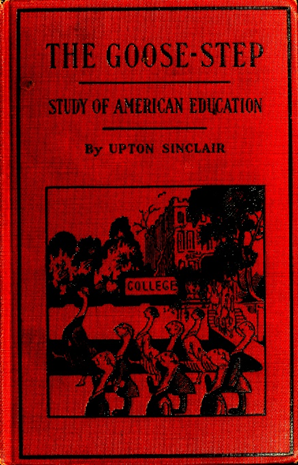Harry Targ
Purdue University announced on
Tuesday that Lilly Endowment is giving it grants totaling $100 million for two
separate university initiatives. The commitment represents the largest private
gift in Purdue’s history.
https://www.forbes.com/sites/michaeltnietzel/2024/01/10/lilly-endowment-grants-100-million-to-purdue-university-its-largest-gift-ever/?sh=3dd917cb3566
The modern university system in the
US developed at the turn of
the twentieth century, as capitalism bounced back after a string of deep
recessions.
Mergers created an economic system in
which a few hundred corporations and banks dominated the entire economy.
Interlocking directorates birthed a system of financial speculation and
concentrated wealth. The government enacted pro-corporate and pro-banking
regulations, allocated tax and other benefits to the wealthy and powerful, and
used repression — as when President Grover Cleveland deployed the army to
break the 1894 Pullman
strike —
on capitalists’ behalf.
During this period, higher education,
which had been dominated by theological pursuits, refashioned itself to serve
the modern economy. Corporations needed workers with scientific and technical
knowledge, so educational institutions were established that could produce
credentialed graduates.
Project Gutenberg
Theoretical work and classroom
education inculcated in the young a reverence for capitalism’s blessings and
the government’s conduct. Young people learned about the benefits of
free-market economies, the United States’ long tradition of democratic institutions,
and the glories of Manifest Destiny, which justified the American conquest of
not only North America, but the Philippine Islands, Cuba, and
Central and South America.
As Clyde Barrow documents in Universities and
the Capitalist State, members of university boards of trustees came largely from
corporations, banks, and law firms that served big business. In the Midwest and
South, trustees who represented regional manufacturing and finance capital ran
the universities. Their outlook paralleled the administrators at the
Northeast’s major universities. Few representatives of non-elite groups, like
labor unions, were ever selected to serve on these boards.
Trustees established an administrative
class that both oversaw the university’s day-to-day operations and managed the
faculty, who produced the school’s key commodities: education and research.
They adopted managerial procedures to control mental labor in the classroom and the laboratory and institutionalized metrics that
measured enrollment, publications, and university rankings to evaluate
productivity.
Federal and state governments, as well
as nonprofit organizations, stepped in to fund a national university system
designed to serve the interests of twentieth-century capitalism. Major
foundations generated studies, conducted surveys, and made recommendations that
influenced both public and private universities’ policies.
Crises, from the depressions of the
late nineteenth century to World War I, sparked critical analyses from some
professors. Frequently, faculty faced discipline or even termination for
challenging the economic system or the state. The university’s educational
mission was to serve elites and the state, not provide a venue for debating
important social issues.
Fast forward to today. The capitalist
class has further consolidated its power in higher education since the Great
Recession of 2008, the Occupy Movement of 2011, the protests around police
violence in 2014, and in response to the police murdering of George Floyd in
2020. Today campuses are alive with debate about Israel’s war on Gaza and
political influentials are seeking to squelch that debate.
Boards of trustees and their advisers
in think tanks and political organizations have used economic and political shocks
to demand greater control over and efficiency in the production and teaching of
knowledge. Economically programs that are not justified as good “investments”
have become vulnerable to termination. Humanities programs now have to prove
their utility to the STEM disciplines (science, technology, engineering, and
mathematics) to survive. And, with the war in the Middle East, politicians, trustees,
and administrators are once again interfering in the educational processes of
the university. (The similarities with the McCarthyite period of the 1940s and
1950s are chilling).
Finally, just as academic critics of child labor,
anti-union policies, World War I, and financial speculation a hundred years ago
faced censure and unemployment, universities are being pressured to
circumscribe accepted debates. While the higher-education system has extended
academic freedom and provided job security for some through tenure, attacks on
these provisions are spreading as the twenty-first century reconstruction of
American higher education proceeds. From Florida to Indiana (the current SB 202 bill
in the Indiana legislature would circumscribe tenure and what is taught in the
classroom), politicians are committed to destroying the academic freedom, and
the free exchange of ideas, that has made universities a haven for the pursuit
of knowledge useful for the advancement of humanity.
https://www.lulu.com/shop/harry-targ-and-daniel-morris/from-upton-sinclairs-goose-step-to-the-neoliberal-university/paperback/product-vzdwyk.html?page=1&pageSize=4




